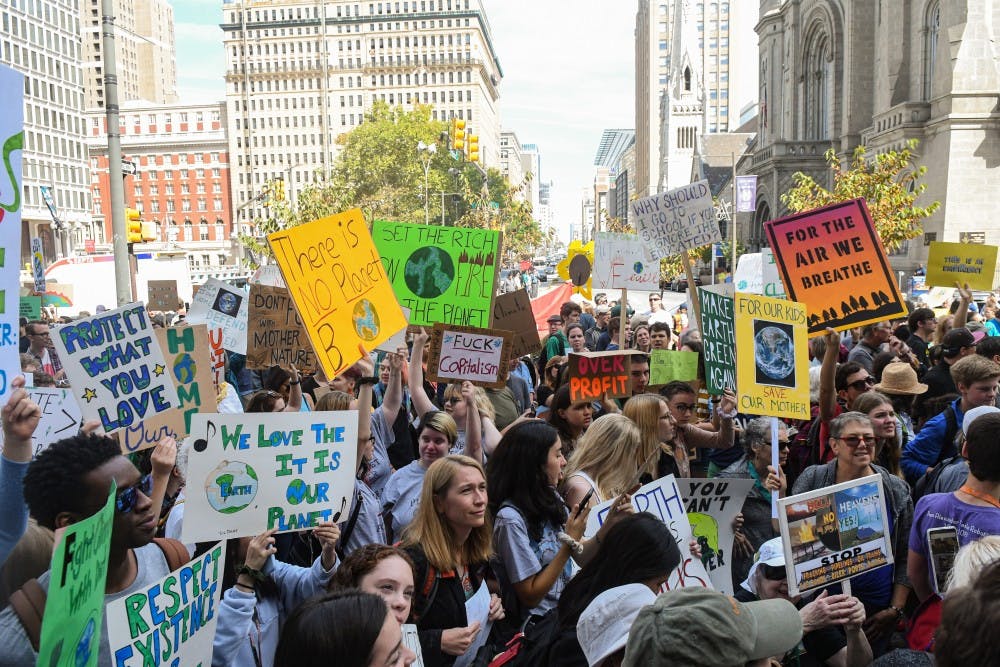Thousands of students passionately marched at the youth-led Climate Strike protests this past week. Students held signs that read “There is no Planet B,” and “We Deserve a Future,” while shouting chants like “Climate change is not a lie!” While the cries for change are necessary at the global scale, they also have an important role closer to home.
Although Wharton offers a concentration in Environmental Policy and Management, there is currently no environmental course requirement in the school’s core curriculum. Meaning, a Wharton student can graduate without ever having taken a course related to environmental responsibility.
Given the critical role financial industries play in climate change, climate education and corporate environmental responsibility must be Wharton’s priority.
According to NASA, global climate change finds source in rising carbon dioxide and methane production. These components are rapidly released into the atmosphere from human activities such as burning fossil fuels and raising domestic livestock.
Just this past month, the Amazon rainforest fires made international headlines, encouraging college students around the country to show solidarity in fear of the threat to our climate. Perhaps the most distressing truth is that this incident was not natural. Instead, the fires are an intentional tool of deforestation, used to clear land for cattle and crops.
The Forest 500, a list of the top firms that play a role in deforestation, gives high ranks to financial institutions such as Citigroup, J.P. Morgan, Deutsche Bank, and more. Financial institutions, many of which actively recruit Wharton students, are investing and participating in actions that harm our planet.
The Intergovernmental Panel on Climate Change states that effective reduction in emissions requires substantial changes in investment patterns. This means that many of the institutions, for whom many Wharton students will work, will have a critical role in shaping our earth's future. Therefore, Wharton has an ethical obligation to ensure these future business leaders are just as educated on the environment as they are on increasing profits.
Wharton is one of the best business schools in the country. Beyond the ethical reasons to emphasize the environment, it should have competitive reasons to do so as well. With concepts like the Green New Deal making headlines, it is very possible to see the near future with a sustainable economy. As one of the top business schools, Wharton should be ahead of this new shift, not behind it.
SEE MORE FROM UROOBA ABID:
Getting sick at Penn opened my eyes to a broken health care system
Penn, make summer courses more accessible to students from all backgrounds
Additionally, Wharton is lucky to have access to a top ranked Urban Studies department through Penn. Studies show that the largest climate mitigation opportunities exist within growing cities. Through partnership, Wharton and Urban Studies students have the opportunity to engage in a dialogue that will actually be essential to finding solutions to the environmental problems facing us today.
Academic collaboration on these issues shouldn’t stop there. Future engineers, policy makers, city planners, and businesspeople all exist together on Penn’s campus. We have a rare opportunity in our time here to cultivate real solutions. We owe it to our planet to make the environment our top educational priority.
The push for awareness on the urgency of climate change has been heard time and time again. Our generation, and those after us, will not be able to evade the effects of the earth’s changing conditions. It’s time for institutions like Penn to take action. Learning how to work with our planet is just as pertinent to our education as accounting or finance. We are past the point of making environmental education a suggestion — it must be a mandate.

UROOBA ABID is a College junior from Long Island, N.Y. studying International Relations. Her email address is uabid@sas.upenn.edu.









